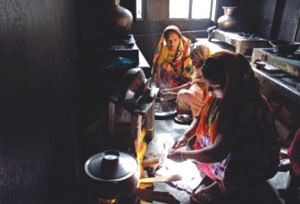|
Energy
Back to square one
Rifat Munim
 |
Photo: Zahedul I Khan |
On one of her busiest weekdays, Nilima Akhter, a resident of Purba Badda, wrapped up her office work a little early to pick her daughter Arani up from school in the afternoon. After a hectic class schedule and work pressure, both of them were famished. Arani was all smiles when she saw her mother rush to the kitchen. Having entered the kitchen, however, Nilima felt defeated as she faced the almost routine cut in the gas supply. All she could do was heave a long sigh to let out her disappointment.
“There is no fixed time-frame for the cut,” says Nilima. “For the last couple of months the gas supply went off early in the morning and resumed usually in the afternoon, in between 3:00pm and 5:00pm. But you cannot afford to wait till 5:00pm for the lunch when your daughter has grown pale for being on an empty stomach for too long,” says Nilima of the ongoing gas crisis, an unrelenting ordeal that has added quite a burden to the already miserable life of the people in many parts of the city including Badda, Mohammadpur and Rampura.
Finding no other way out, Nilima, like many of her neighbours, had to make do with the newly bought kerosene stove for cooking, which takes a lot more time than a gas stove. By the time the cooking was finished, Arani was sleeping her exhaustion away while her mother was occupied by the thought of what would happen at night and the next morning.
What is most frustrating to individuals like Nilima is the sheer uncertainty of the whole situation. Sometimes the gas cut occurs in the daytime while some other times it baffles all by going off in the evening and resuming in the early hours of morning, eventually turning the previously held balance, if there is any, upside down.
“It has been months since it all started. But I've not yet learned to cope with the sheer uncertainty of when there will be a supply and when not,” says Nilima.
Things for Khadiza Yasmin, another working woman living at the Madrasa Road in Mohammadpur are a little better since she, at least, seems to have some sort of prior knowledge as to when the routine cut will begin.
“There is hardly an exception. It always starts at 8 in the morning and comes back at 2pm,' says Yasmin.
“It's like going back to the time when there was no gas and all cooking was to be done by bad smelling kerosene stove or wood. May be that was a better time especially in terms of uninterrupted supply. But this means requiring you to spend all your time cooking, which is impossible for a working person. So a gas stove is essential for us without which our life loses its rhythm,” she adds.
Having adopted all these alternative means of cooking which also includes the wood-burning stove, the affected city dwellers have been forced to adapt to a new lifestyle altogether. The toll of coping with the alternative means is really high for all households as many have opted for the risky gas cylinders.
 |
| Kerosene stoves mean spending all day cooking and this is impossible for working women. |
“Untimely supply of gas has compelled me to seek alternatives. But considering the time-consuming process of the kerosene stove, we decided to buy the cylinder which is very expensive and hazardous at the same time,” says Snigdha Rahman, a neighbour of Nilima.
Despite the slight differences in adopting the various means, there is a lot in common with the lifestyle of the affected people most of whom now take to cooking for long hours when the supply is on.
“Now I usually cook in the afternoon. First I prepare food for the dinner, then I start cooking the breakfast and lunch for the next day so that we don't have to starve when gas is not available,” says Yasmin.
Amidst a burgeoning power crisis, which is said to have crippled both daily life and many of the national industries, a recent government move to shut down the CNG filling stations has been put into action to channel a considerable amount of gas into the generation of electricity. As a result, on the one hand the power outage has lessened, and on the other, traffic congestion has worsened when the CNG stations are about to close and open. The domino effect of the gas crisis has left Dhaka dwellers preoccupied either with outage or with tailbacks overlooking the long-standing gas cuts in households.
Beginning in January this year, which affected a good number of the localities in the city, the crisis still persists in the above-mentioned parts of the city. According to a Petrobangla report, against a growing demand of 2400MMCFD, the country has a national production of 2000MMCFD. While the major part from the national grid is diverted to power generation, large-scale industrialisation and fertiliser plants, demand from the domestic consumers of gas is also on the rise. About 14% gas from the national grid is provided for the domestic consumers. But as more and more households can afford gas connections from the gas distributing companies, the gap between production and demand is bridged by cutting gas supply in much the same way as regular power cuts.
But while the power cuts are common in every area of the city as well as the country, questions naturally arise as to why the gas cuts are occurring only to a handful of localities in Dhaka.
“I'm quite aware of a shortage in supply five or six months ago. Back then gas supply was sometimes withheld for even ten hours at a stretch in many parts of the city. But with the production increasing in several gas fields, we got over with it before Eid,” says Md Abdul Aziz Khan, the managing director of Titas Gas Transmission and Distribution Company Limited.
“We also took several initiatives to tackle the outage problems providing more for electricity generation than the allocated amount. Even so, we succeeded to deal with the gas cuts in domestic households. But none of us are aware of an ongoing crisis in some of the city areas,” he adds.
Following the yearlong crisis, although a group of people had a chance to make some quick money by hiking up the price of kerosene stove and the like, a lot of people are going through distress, which has unduly become a part of their quotidian existence.
“We don't pay less. Nor do we make any irregularities regarding bill payment. Then why should we go through all this while everyone else in the city is enjoying uninterrupted supply of gas?” complains Yasmin.
While many attribute it to the irregularities done by some unscrupulous officials of the distributing companies, many believe that by exploring new gas fields, which is within the purview of Petrobangla's responsibility, the overall gas production can be increased.
Asked about a probable solution, Md Aziz Khan says, “We cannot go beyond our capacity. Taking into account the national production, I think we have gone a long way to address several issues. As for the sufferings of domestic users, we will try to take immediate steps to check this.”
Copyright
(R) thedailystar.net 2010
|

